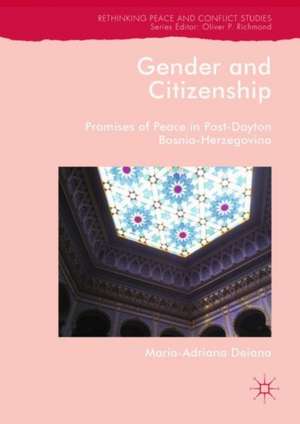Gender and Citizenship: Promises of Peace in Post-Dayton Bosnia-Herzegovina: Rethinking Peace and Conflict Studies
Autor Maria-Adriana Deianaen Limba Engleză Hardback – 11 mai 2018
Din seria Rethinking Peace and Conflict Studies
-
 Preț: 357.93 lei
Preț: 357.93 lei -
 Preț: 113.00 lei
Preț: 113.00 lei - 15%
 Preț: 646.62 lei
Preț: 646.62 lei -
 Preț: 318.69 lei
Preț: 318.69 lei - 20%
 Preț: 565.31 lei
Preț: 565.31 lei -
 Preț: 272.92 lei
Preț: 272.92 lei -
 Preț: 387.20 lei
Preț: 387.20 lei - 15%
 Preț: 574.77 lei
Preț: 574.77 lei - 15%
 Preț: 699.45 lei
Preț: 699.45 lei -
 Preț: 390.63 lei
Preț: 390.63 lei - 15%
 Preț: 639.25 lei
Preț: 639.25 lei -
 Preț: 390.63 lei
Preț: 390.63 lei - 15%
 Preț: 644.30 lei
Preț: 644.30 lei -
 Preț: 390.63 lei
Preț: 390.63 lei - 15%
 Preț: 644.95 lei
Preț: 644.95 lei -
 Preț: 392.21 lei
Preț: 392.21 lei -
 Preț: 384.86 lei
Preț: 384.86 lei -
 Preț: 387.58 lei
Preț: 387.58 lei -
 Preț: 386.99 lei
Preț: 386.99 lei -
 Preț: 385.84 lei
Preț: 385.84 lei -
 Preț: 388.72 lei
Preț: 388.72 lei -
 Preț: 390.63 lei
Preț: 390.63 lei -
 Preț: 389.49 lei
Preț: 389.49 lei -
 Preț: 391.61 lei
Preț: 391.61 lei -
 Preț: 390.63 lei
Preț: 390.63 lei -
 Preț: 391.61 lei
Preț: 391.61 lei -
 Preț: 389.88 lei
Preț: 389.88 lei -
 Preț: 386.39 lei
Preț: 386.39 lei -
 Preț: 426.56 lei
Preț: 426.56 lei -
 Preț: 389.88 lei
Preț: 389.88 lei -
 Preț: 389.88 lei
Preț: 389.88 lei -
 Preț: 417.14 lei
Preț: 417.14 lei - 15%
 Preț: 699.93 lei
Preț: 699.93 lei -
 Preț: 392.60 lei
Preț: 392.60 lei -
 Preț: 389.11 lei
Preț: 389.11 lei - 18%
 Preț: 783.25 lei
Preț: 783.25 lei -
 Preț: 392.60 lei
Preț: 392.60 lei -
 Preț: 388.72 lei
Preț: 388.72 lei -
 Preț: 388.72 lei
Preț: 388.72 lei -
 Preț: 388.52 lei
Preț: 388.52 lei
Preț: 890.54 lei
Preț vechi: 1086.03 lei
-18% Nou
Puncte Express: 1336
Preț estimativ în valută:
170.40€ • 178.39$ • 140.100£
170.40€ • 178.39$ • 140.100£
Carte tipărită la comandă
Livrare economică 07-21 aprilie
Preluare comenzi: 021 569.72.76
Specificații
ISBN-13: 9781137593771
ISBN-10: 1137593776
Pagini: 220
Ilustrații: XI, 220 p. 4 illus.
Dimensiuni: 148 x 210 mm
Greutate: 0.43 kg
Ediția:1st ed. 2018
Editura: Palgrave Macmillan UK
Colecția Palgrave Macmillan
Seria Rethinking Peace and Conflict Studies
Locul publicării:London, United Kingdom
ISBN-10: 1137593776
Pagini: 220
Ilustrații: XI, 220 p. 4 illus.
Dimensiuni: 148 x 210 mm
Greutate: 0.43 kg
Ediția:1st ed. 2018
Editura: Palgrave Macmillan UK
Colecția Palgrave Macmillan
Seria Rethinking Peace and Conflict Studies
Locul publicării:London, United Kingdom
Cuprins
1. Revisiting Dayton: Unfinished (Feminist) International Relations.- 2. Trajectories of Women’s Citizenship from Socialism to the Bosnian War.- 3. The Politics of Not/Belonging: Making sense of Post-Dayton exclusions.- 4. Women’s personal narratives and the multi-layered legacies of war.- 5. Collective visions for citizenship and challenges of transversal politics as practice.- 6. Is another citizenship possible? Hopeful political practices in the Post-Dayton impasse.- 7. Conclusions.
Notă biografică
Maria-Adriana Deiana is a Lecturer in International Relations in the School of Law and Government, Dublin City University, Ireland. Her research draws on feminist approaches to war and security. It focuses on gender dynamics of conflict and post-conflict transformation, the Women, Peace and Security (WPS) agenda, EU border politics and peacekeeping.
Textul de pe ultima copertă
This book examines the remaking of women’s citizenship in the aftermath of conflict and international intervention. It develops a feminist critique of consociationalism as the dominant model of post-conflict governance by tracking the gendered implications of the Dayton Peace Agreement. It illustrates how the legitimisation of ethnonationalist power enabled by the agreement has reduced citizenship to an all-encompassing logic of ethnonational belonging and implicitly reproduced its attendant patriarchal gender order. Foregrounding women’s diverse experiences, the book reveals gendered ramifications produced at the intersection of conflict, ethno-nationalism and international peacebuilding. Deploying a multidimensional feminist approach centred around women’s narratives of belonging, exclusion, and agency, this book offers a critical interrogation of the promises of peace and explores individual/collective efforts to re-imagine citizenship.
Maria-Adriana Deiana is a Lecturer in International Relations in the School of Law and Government, Dublin City University, Ireland. Her research draws on feminist approaches to war and security. It focuses on gender dynamics of conflict and post-conflict transformation, the Women, Peace and Security (WPS) agenda, EU border politics and peacekeeping.
Caracteristici
Draws on feminist ethnographic and narrative traditions to challenge abstract understandings of war/peace and revisit the implications of post-conflict international interventions. Deploys a multidimensional approach centred on belonging, agency and spaces of activism to explore the remaking of women’s citizenship in the aftermath of conflict and international intervention. Tracks consociationalism‘s gendered exclusions beyond the institutional domain foregrounding discursive and non-discursive ramifications in the public and private practices of everyday life.
